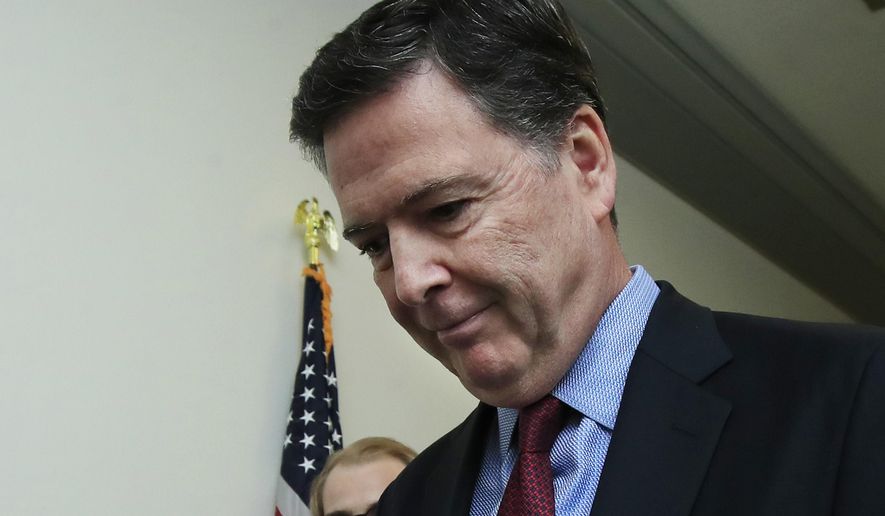The FBI brought its Russia probe directly to candidate Donald Trump in August 2016, disguising its intentions as a routine counterintelligence briefing on spy threats, newly declassified documents show.
The written outline for the Aug. 17, 2016, briefing by FBI agent Joe Pientka and his final report, were both titled “Crossfire Hurricane,” according to the papers declassified Thursday by Director of National Intelligence John Ratcliffe. The Washington Times obtained the documents.
The FBI’s Crossfire Hurricane probe was opened July 31, and Trump associates were picked for targeting days before Mr. Trump arrived at the bureau’s New York field office. He was accompanied by former New Jersey Gov. Chris Christie and retired Army Lt. Gen. Michael Flynn, whom the FBI had selected for targeting the previous day.
Mr. Trump and his associates all thought the sole purpose was to receive a classified “defensive briefing.”
But the FBI documents said otherwise. And from the report by Justice Department Inspector General Michael E. Horowitz in December, Mr. Pientka wanted to deliver the briefing so he could size up Mr. Flynn.
Said a Republican congressional source: “Every part of this FBI investigation stunk to high heaven, and it turns out even the defensive briefing of Trump was part of that investigation.”
DOCUMENT: Declassified FBI document brief
“They spied on the campaign … never been done before. They spied on the other campaign using intelligence,” President Trump told Fox News host Sean Hannity.
The FBI would go on to watch Mr. Trump and his White House staff. FBI emails obtained by watchdog Judicial Watch show that agent Peter Strzok, who led Crossfire Hurricane, was “angry” because no one told him of a planned counterintelligence briefing at the White House right before inauguration. Mr. Strzok said in the email that the briefing could have been helpful to his investigation.
Then-FBI Director James B. Comey visited President-elect Trump in Trump Tower in January 2017. Mr. Comey briefed him on the now-discredited Christopher Steele dossier and then rode to the field office to file a report via teleconference with Mr. Strzok’s team in Washington.
The FBI had opened the Flynn case, not because it had evidence that he colluded with Moscow, but because as Defense Intelligence Agency chief and in retirement, he had some contacts with Russians.
On Jan. 4, 2017, the FBI cleared Mr. Flynn of any improper Russian contacts.
Mr. Pientka’s outline and final briefing report show that he delivered a fairly routine lesson on Russia’s, China’s and other countries’ intelligence officers who might try to penetrate the campaign. He offered routine advice on phone and computer use.
He did not tell Mr. Trump that Russia had hacked Democratic Party and Hillary Clinton campaign computers that spring.
Besides Mr. Flynn, the FBI opened cases against three other Trump associates in August.
The briefing report by Mr. Pientka, called an “electronic communication,” was titled “Crossfire Hurricane; Foreign Agents Registration Act-Russia; Sensitive investigative matter. Crossfire Razor.”
“Crossfire Razor” was the code name given to Mr. Flynn.
Among the items in Mr. Pientka’s post-briefing report:
⦁ “Upon entering the room Trump, Christie and Flynn shook hands with all of the briefers. Trump, Christie and Flynn sat with their backs to the clocks facing the windows while the briefers sat across from them.”
⦁ “Good afternoon gentlemen and welcome to the FBI’s New York field office. My name is Joe Pientka and I’m a Supervisory Special Agent of a Foreign Counterintelligence Squad at the FBI’s Washington Field Office. Prior to you receiving the classified presentations from the ODNI briefers, I will provide you with a counterintelligence and security brief that will give you a baseline on the methodology used by Foreign Intelligence Services to the detriment of U.S. National Security.”
⦁ “Trump asked the following question, ’Joe, are the Russians bad because they have more numbers are they worse than the Chinese?’ Writer responded by saying both countries are bad. The numbers of IOs present in the U.S. is not an indicator of the severity of the threat. Writer reminded Trump the Chinese asymmetrical presence in the U.S. [redacted].”
The Pientka report was approved by FBI lawyer Kevin E. Clinesmith. He was accused in the Horowitz report of fabricating a CIA email to make it look like Trump campaign volunteer Carter Page had not worked for the agency, when in fact he had been an informant.
• Rowan Scarborough can be reached at rscarborough@washingtontimes.com.




Please read our comment policy before commenting.